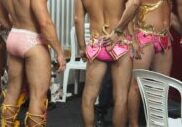
There’s a metaphysical connection among all the films of Marco Berger. His latest offering The Carnival plays out like a semi-documentary version of his previous works. There’s a bit of Taekwondo (2016) in it with semi-naked bodies of hunky men on generous display. Actor Gaston Re who starred in Berger’s previous films The Blonde One (2019) and Taekwondo has a significant role here too. As expected and to the much delight of his hardcore fans, the trademark Marco Berger feeling of impalpable sexual tension is written all over the film. The Carnival thrives on the idea of contrasts – homoerotic probability in a traditional setting. Marco tells a story of cultural pride as well as the pride of sexual choice and how they can share the same social space without compromising on either of its authenticity.
 In the earlier films of Berger, we get a distinct urban taste of Argentina where the queer leads always feel at home amidst characters who are on the verge of sexual fluidity. Berger deliberately creates an isolated world of limited characters where homosexuality is never frowned upon by heterosexual characters. In The Carnival, however, this sense of security faces scrutiny and possible threat as the canvas is larger here. The story – part reality and part fiction – is narrated by two leads – one gay (Vilmar Paiva) and the other straight (Franco Heiler). Shot on live locations at Argentina’s famed Carnival Gualeguaychú, the lead actor-narrators faces the public gaze and the assumptions that come along with it, head-on, while wearing their hearts on their sleeves. Every man and woman who takes part in the carnival procession has to don skimpy, frilly and colorful costumes, as a rule. And the participants, especially the men, happily wear and flaunt them without displaying any sense of insecurity. The whole atmosphere of the carnival reminds one of queer pride parades where queer people and their ally marches in solidarity with the queer community.
In the earlier films of Berger, we get a distinct urban taste of Argentina where the queer leads always feel at home amidst characters who are on the verge of sexual fluidity. Berger deliberately creates an isolated world of limited characters where homosexuality is never frowned upon by heterosexual characters. In The Carnival, however, this sense of security faces scrutiny and possible threat as the canvas is larger here. The story – part reality and part fiction – is narrated by two leads – one gay (Vilmar Paiva) and the other straight (Franco Heiler). Shot on live locations at Argentina’s famed Carnival Gualeguaychú, the lead actor-narrators faces the public gaze and the assumptions that come along with it, head-on, while wearing their hearts on their sleeves. Every man and woman who takes part in the carnival procession has to don skimpy, frilly and colorful costumes, as a rule. And the participants, especially the men, happily wear and flaunt them without displaying any sense of insecurity. The whole atmosphere of the carnival reminds one of queer pride parades where queer people and their ally marches in solidarity with the queer community.
Through the film, Marco Berger pays homage to his homeland Argentina and its socio-economic culture, which nurtured his queer sexuality and gave him a voice and an identity. His guest appearance in the film, as a documentary director, adds an autobiographical layer to it. It can also be interpreted as an act of self-aggrandizement as the time is ripe to celebrate Marco Berger as one of the most daring and evocative queer film-makers of the 21st century.
The DVD/Online streaming releases on September 21st, 2021. from TLA
Review by David Lagachu
Queeruru’s newest Correspondent lives in India “I am constantly trying to find a perfect balance between academia and my love for writing about films, pop and queer culture. I consider myself a global citizen and would love to be a part of a significant history of mankind.”

